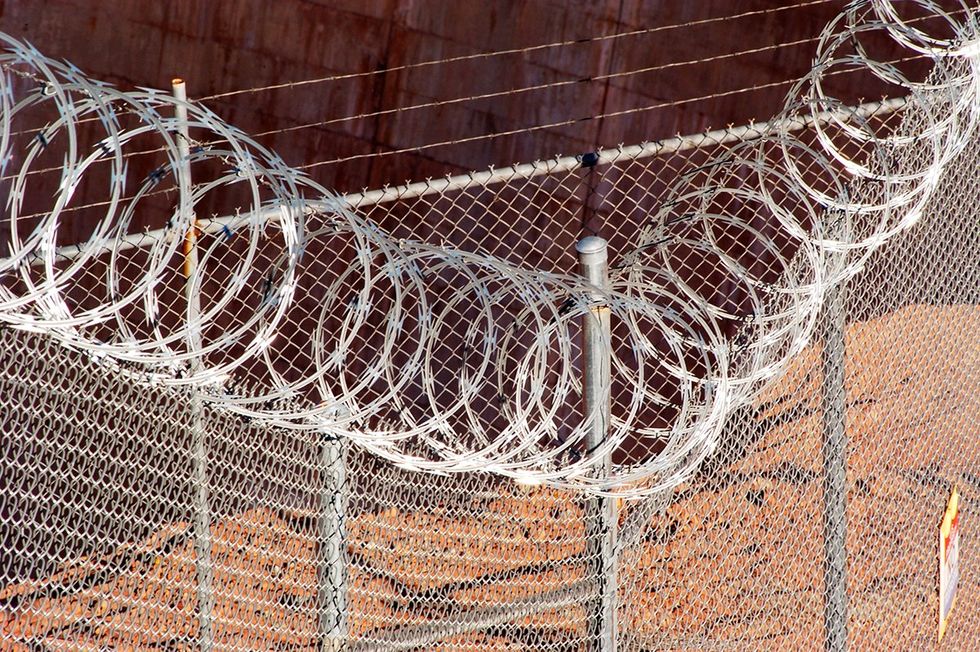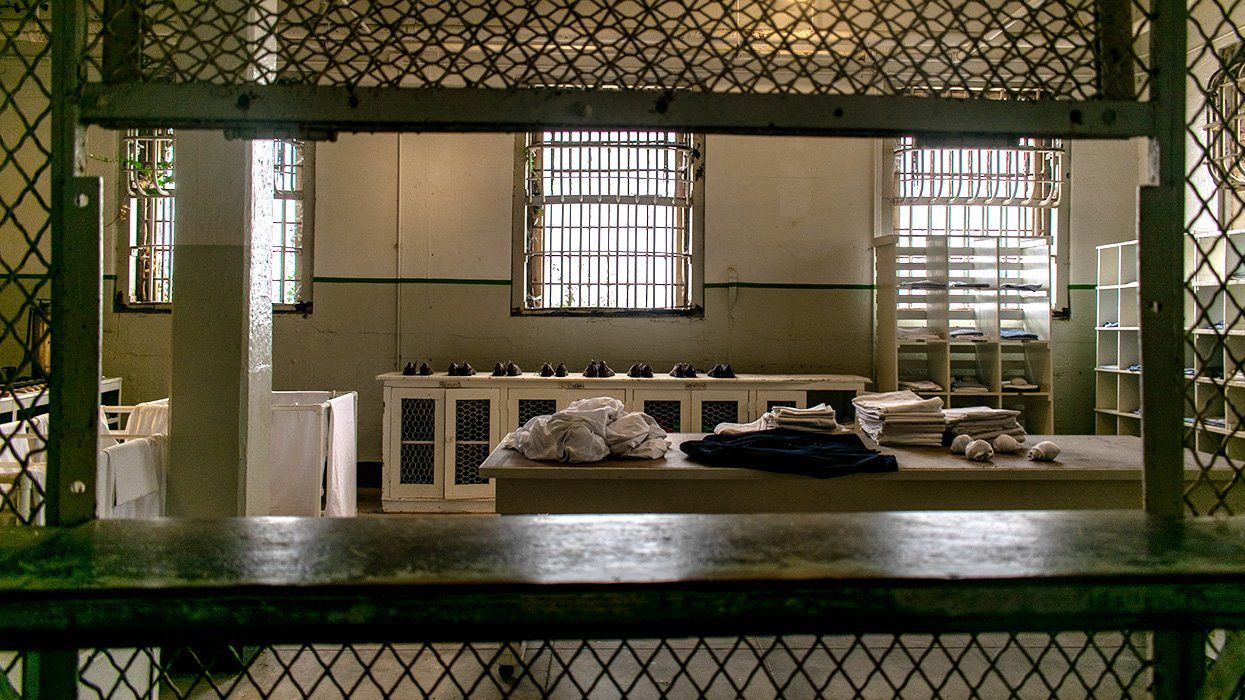All Rights reserved
By continuing to use our site, you agree to our Privacy Policy and Terms of Use.
Your support makes The Advocate's original LGBTQ+ reporting possible. Become a member today to help us continue this work.
Even as people fight for justice, some cries remain unheard and voices unanswered. In American society, many of these lost voices belong to the incarcerated, who are cut off, ignored, and forgotten behind prison walls.
People in prison suffer daily, and their abusers go unpunished. These incarcerated victims are treated with inhuman disregard and live in squalid conditions; they are oppressed, dehumanized, tortured, raped, and even slaughtered. Many have little or no communication with loved ones and are overlooked or dismissed by media and policymakers.
Among the most oppressed of all are members of the incarcerated LGBTQIA+ community—and among these, transgender individuals. They are constantly discriminated against and perpetually targeted by staff and other incarcerated people alike. Ridiculed, taunted, and assaulted, many are provided with little or no protection and forced to endure in silence.
As a female-to-male (F2M) transgender person, I have personally experienced cruel mistreatment from prison officers and medical staff. I’ve been in solitary confinement for seven years and counting due to my gender identity, since solitary is standard practice for housing transgender people in Texas prisons. I’ve been further punished as retribution against me for published exposés and filed complaints that initiated investigations, causing controversy about the harsh conditions and abuse to which transgender individuals are being subjected.
On paper, the Texas Department of Criminal Justice’s policy on transgender prisoners is supposed to prevent non-medical staff from examining trans people for the sole purpose of determining their genitals, with the system requiring trans people to be referred to medical during intake. The policy also states that people who experience gender dysphoria should be evaluated by medical and mental health professionals and receive treatment on a case-by-case basis. Placement and programming for trans people are reassessed semiannually “for their safety.” However, the reality is something very different.

Being F2M transgender in prison is a battle that’s inevitably lost. I am consistently denied hospital appointments with gender dysphoria specialists and denied mental health treatment. I am physically assaulted, bullied, and taunted by them with transphobic slurs. I’ve been denied contact with loved ones, starved, and forced to live in extreme temperatures as we’re given no seasonal clothing during the colder months or respite from the heat during the warmer ones.
Daily, I’ve been forced to suppress my being beyond injury, coerced to wear the humiliating “dress gowns,” denied boxers, bullied into wearing panties, refused gender-related hygiene products, forced to shave facial hair with dull razors, and subject to a variety of other sinister and humiliating tactics. The abuse by staff on all levels carries on with impunity. With no response from the Texas Department of Criminal Justice, the system makes it straightforward to transgender incarcerated people that we, indeed, are forgotten.
In 2020, I was dragged to the showers by two white male officers, beaten and kicked until I was bleeding inside and out, and dumped naked back in my cell. After being denied medical attention for days despite intense pain, I attempted suicide—and was finally sent to a hospital. I was told that the officers involved could not be disciplined because the assault was not captured on camera. Once again, my own voice was ignored and silenced.
The impact this trauma has had on my physical, emotional, and psychological stability is dire. These impairments have gone untreated while I remain in solitary confinement, and I fear the mental cost that I and other incarcerated transgender people will have to pay in the future from enduring such abuse.
I am not alone in enduring this daily suffering. During my time in solitary confinement, I have had the opportunity to interview other F2M transgender individuals, all of whom have their own stories of abuse ranging from humiliation to sexual assault.
Keyyor Tugler has been held in solitary confinement for three years. “They never give me fresh razors,” he said. “They won't give me boxers. The men officers are real cruel here. I'm called everything from "tr*nny," "b*tch," "weirdo," anything but my name. I've been jumped on by officers several times. My shoulder was knocked out of the socket last time. I never saw medical for it.”
“I’ve been in solitary confinement since 2008,” said Sonya Parker. “I’m F2M and I’ve been sexually assaulted twice by men officers. I’ve had my jaw broken, leg broken and I‘ve had to have surgery on my hips due to assaults. I've been beaten so bad to the point of memory loss.” He continued, “I've been denied hormones, boxers and my men hygienes. Life has been horrible for me and I don’t have no outside support to make complaints on my behalf for all the abuse I’ve suffered. And my cries are ignored. Solitary confinement is depressing. A lot of days I think of wanting to die.”
Sexual assault is an alarmingly common experience for transgender people in prison. In a 2015 study published by the National Center for Transgender Equality, 30 percent of transgender respondents had reported physical or sexual assault in the past year while incarcerated. Eleven percent reported sexual assault by a prison staff member, which is five to six times higher than the sexual assault rate for cisgender imprisoned people. In addition to assaults by staff, the study found that transgender people are nine to ten times more likely to be sexually assaulted by another incarcerated person. Advocates say that transgender sexual assaults, like all prison sexual assaults, are likely undercounted and underreported because staff often dismiss reports or retaliate against people for reporting.

Transgender people already face a heightened risk of mental health conditions, and the psychological harm is exacerbated behind prison walls. A 2023 article in the Journal of Correctional Health Care found that 90 percent of incarcerated trans people reported a mental health diagnosis, in comparison to 67.1 percent of cisgender women and 38 percent of cisgender men. Gender dysphoria leads to increased mental health struggles, anxiety, depression, and risk of attempted suicide, according to the Icahn School of Medicine at Mount Sinai.
Treatment for gender dysphoria includes counseling, gender-affirming hormone therapy, and gender-affirming surgery, but in prison, these treatments are usually inaccessible. In addition, prisons most commonly determine a person’s gender based on a combination of gender assignment at birth and anatomy, which not only disregards and disrespects trans people’s gender identity but can put their lives at risk and force them into solitary confinement.
What I have captured here are only some of the gruesome and disturbing experiences of transgender people in Texas prisons. They are isolated in solitary confinement and subjected to oppression, predation, violence, and near-annihilation solely due to their gender identity. When such heinous tyranny and callousness towards human life and dignity occur, what recourse is available to people who are locked in concrete boxes and cut off from the rest of humanity?
It took courage for the people I interviewed for this article to share their stories with me. Tears were shed and hearts rebroken. Their hope—and mine—is that telling their stories will make some difference. Such treatment of transgender individuals may have been normalized, but it is not “normal,” and it can and must be stopped.
Nelson Mandela once stated, “No one truly knows a nation until one has seen inside its jails.” Please reflect upon those words as you see through the eyes of some of the survivors. May the light shine on those who are forgotten.
Xandan (he/him) is a female-to-male trans person and writer incarcerated under his legal name, Britney Gulley, in a Texas state prison. This essay is provided by Solitary Watch, which is committed to providing news and information on solitary confinement in U.S. prisons and jails. Xandan's work was supported by a grant from Solitary Watch's Ridgeway Reporting Project with funding from the Vital Projects Fund. Learn more about them at solitarywatch.org.
Have an inspiring personal story to tell? Want to share an opinion on an issue? Learn more by visiting advocate.com/submit.
- Transgender inmate killed in prison fight in Louisiana ›
- Texas Supreme Court lets gender-affirming care ban remain ›
- Man charged with kidnapping and assaulting Texas trans women ›
- Trans inmate sues over Trump's 'two sexes' order ›
- Houston group leads fight for trans rights under GOP attacks ›
- Justice Dept. pulls 'nonessential' funds from Maine prison system over trans inmate housed with women ›
- Judge tells federal prisons ro provide gender-affirming care ›
- Trump ending sexual violence protections for LGBTQ+ inmates ›




































































Charlie Kirk DID say stoning gay people was the 'perfect law' — and these other heinous quotes